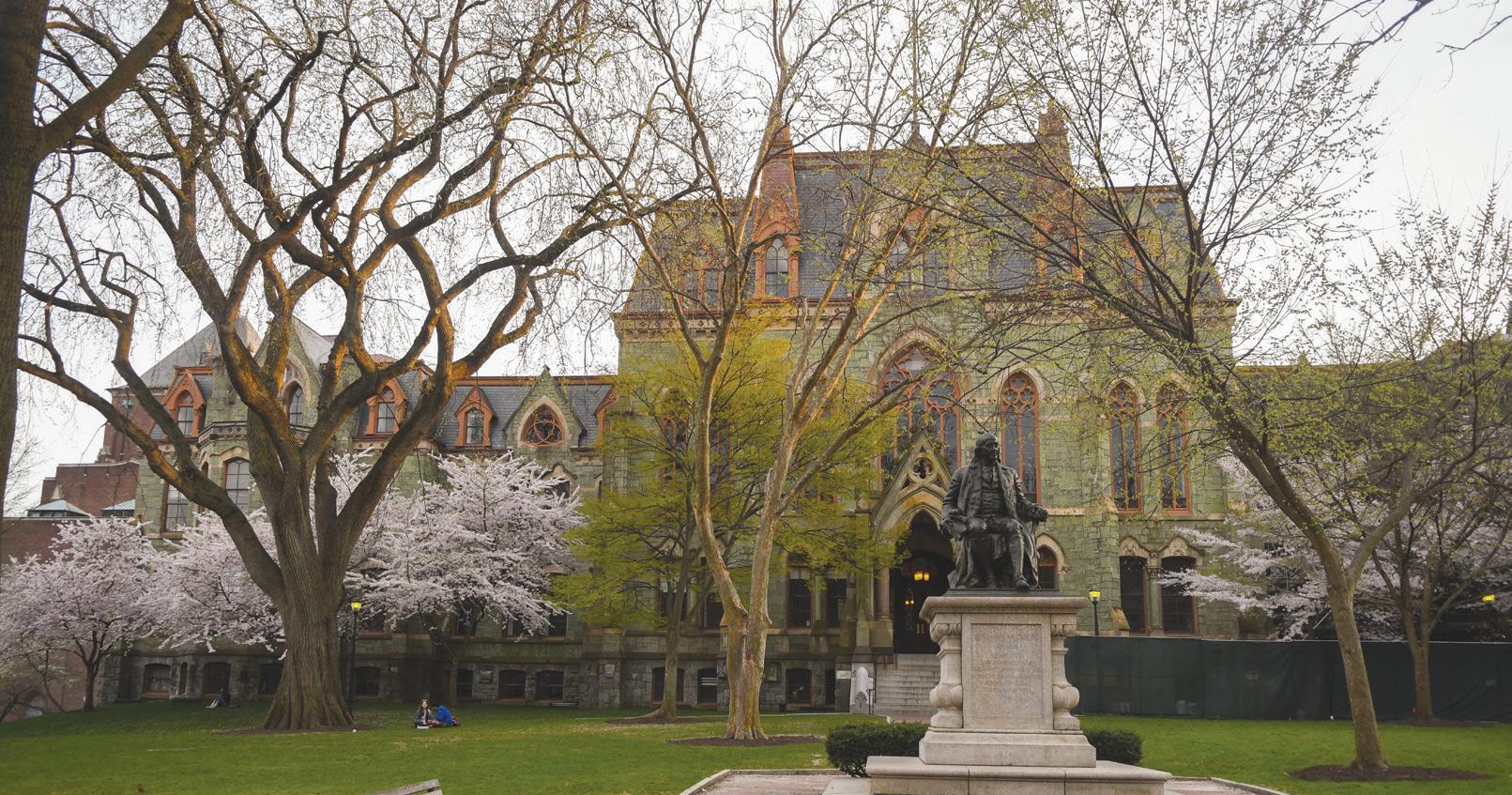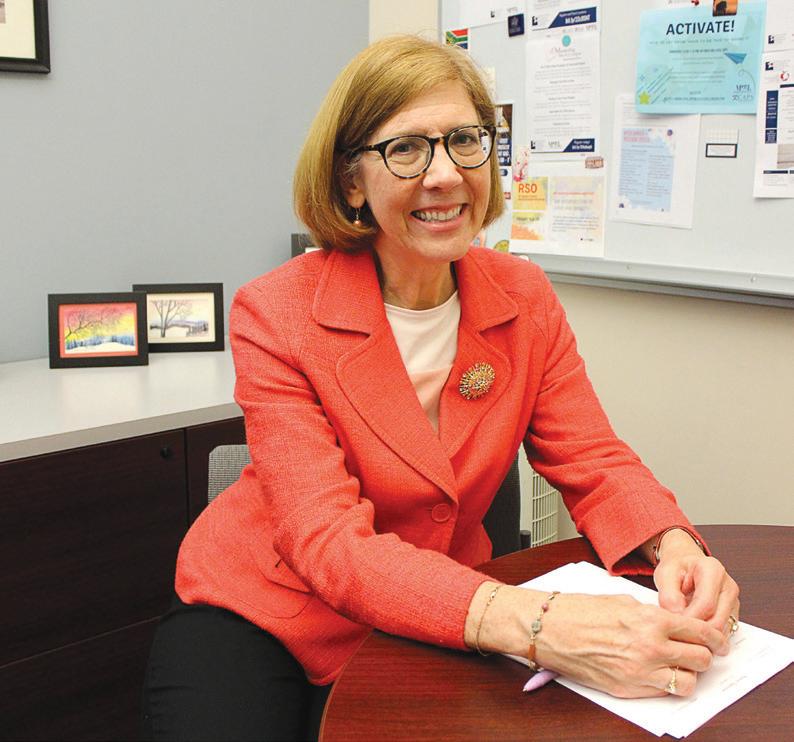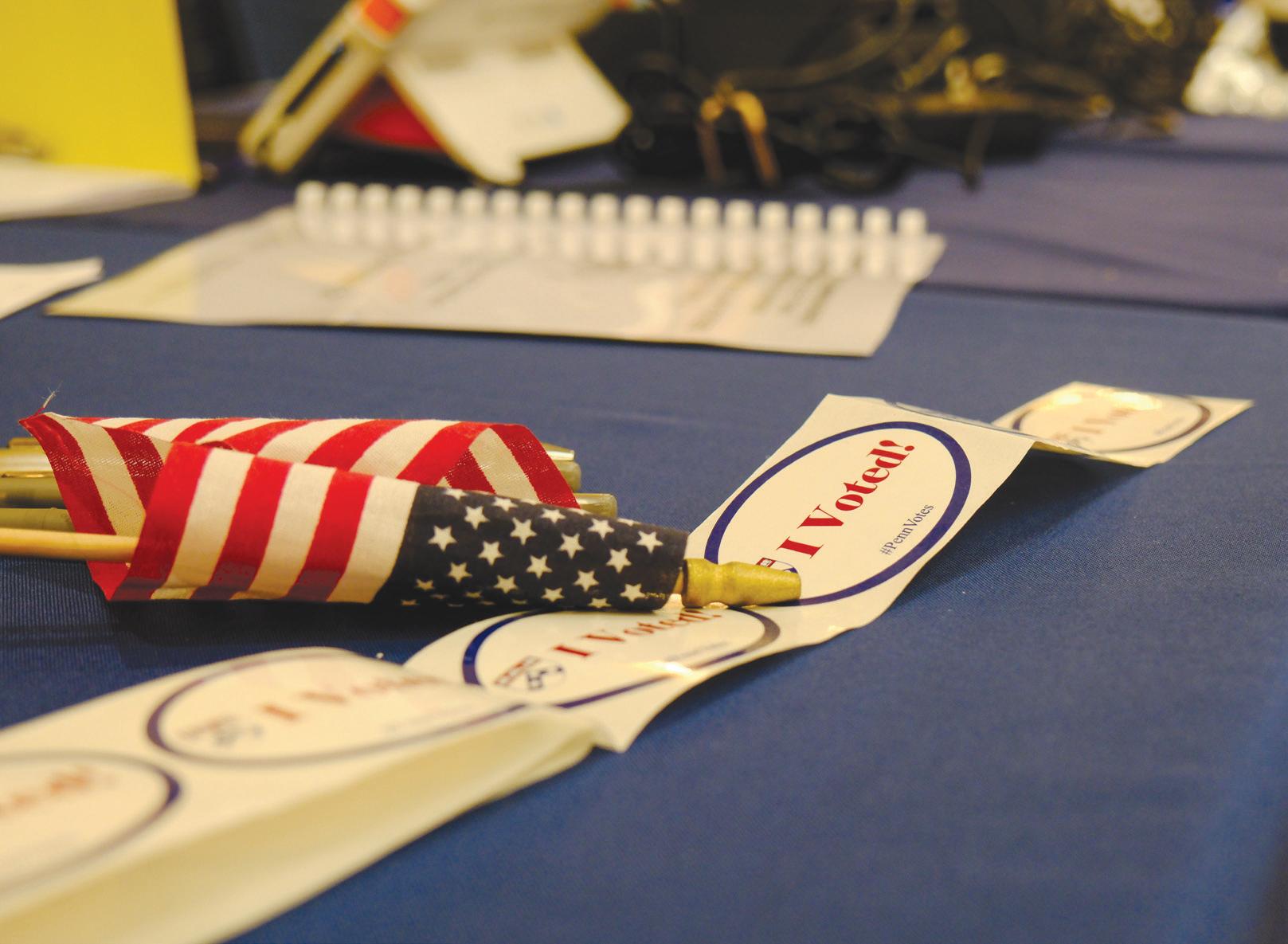‘JUST SHATTERED’
Penn lightweight rowing accused of racism, prompting controversial University response

individuals close to the Penn rowing program described a pattern of racist remarks made by members of the men’s lightweight rowing team, as well as an allegedly inadequate response to these incidents by the University.
In interviews with The Daily Pennsylvanian, sources directly familiar with the matter alleged that members of Penn’s lightweight rowing team used racist slurs to refer to Black women’s rowers during the 2023-24 season. One member of the lightweight rowing team repeatedly used the N-word in front of other players, the sources alleged, adding that there was an insufficient response to this rower’s behavior by the team’s coaching staff and Penn Athletics officials. The rower remains on the lightweight rowing roster.
Muslim Students Association seeks referendum on whether Penn should divest from Israel
The petition, which gathered the 500 signatures necessary to be sent to the undergraduate student body, came before the Nominations and Elections Committee for approval on Wednesday
Penn’s Muslim Student Association is seeking a referendum of the undergraduate student body on three questions related to the University’s response to the Israel-Hamas war. The petition, which was circulated by Penn MSA and reposted by Penn Students Against the Occupation, asks students whether the University should divest its endowment fund from companies and organizations that “profit from, engage in, or contribute to the government of Israel’s human rights violations.” The petition, which gathered the 500 signatures necessary to be sent to the undergraduate student body, came before the Nominations and Elections
All eight individuals who spoke with the DP asked to remain anonymous.
“It’s pretty clear that [Penn] Athletics as a whole is lagging pretty significantly on appropriate responses toward athlete safety,” a source close to the women’s rowing program said. “… And that if [their] image isn’t called into question, it’s all going to go down quietly.”
Another source directly familiar with the situation suggested that the racist remarks were consistent with an environment tolerant of offensive behavior.
“Penn rowing is very much known to protect its boys,” the source said.
One of the primary victims of the alleged verbal abuse was a Black member of the women’s rowing team. She recounted several specific instances of
alleged racism that took place during fall 2023.
In this rower’s experience, which was corroborated by multiple sources directly familiar with Penn women’s rowing, the most frequent perpetrator of this alleged racist behavior was an individual lightweight rower. This rower had allegedly garnered a reputation for perpetuating verbal racism, including repeated use of the N-word. A source close to the lightweight rowing program also reported having heard firsthand the rower in question make “racist remarks.”
The women’s rower described a specific incident that occurred last fall in which she and a friend, who is also on the women’s rowing team, were greeted by the lightweight rower while they were eating together at Hill House dining hall. Both the women’s rowers were confused by the interaction, as neither had
spoken with the lightweight rower previously.
Later, they were informed by another member of the lightweight rowing team that after greeting them, the lightweight rower returned to a table where he was sitting with his teammates and made racist remarks about the women’s rowers’ appearances.
“He made a joke to the whole table saying that I looked like I came off the ‘12 Years a Slave’ ship,” the women’s rower said she was informed by another lightweight rower. “The whole table heard it, and they said nothing about it — they didn’t shut it down. He’s been known to make these jokes … and they just foster this environment that allows him to keep on going.” See ROWING, page 7

Editor Committee
Penn students voice concern over Spring Fling concert safety following record attendance
Organizers said they were “de nitely concerned” about students’ safety during the concert after attendees reported feeling uncomfortable due to inadequate crowd control
EMILY
Penn students reported dissatisfaction with the University’s crowd control and safety protocols at last weekend’s Spring Fling concert — but several said that they enjoyed the event regardless.
“want to give agency to
to voice their concerns to administration through a mechanism that is democratic, strategic, and fair.”
understand that the MSA is proposing an unprecedented referendum and we want to ABHIRAM JUVVADI | PHOTO EDITOR College Hall on April 14.
Over 10,000 students attended Spring Fling last weekend, which featured performances by Metro Boomin and Daya. Students who attended reported feeling uncomfortable and fearing for their safety — particularly in the entrance line and during the concert itself — due to a lack of adequate crowd control management, and the Social Planning and Events Committee’s leadership wrote to The Daily
CONTACT US: 215-422-4640 SEND STORY IDEAS TO NEWSTIP@THEDP.COM ONLINE AT THEDP.COM THE INDEPENDENT STUDENT NEWSPAPER OF THE UNIVERSITY OF PENNSYLVANIA • FOUNDED 1885 PHILADELPHIA, THURSDAY, APRIL 25, 2024 VOL. CXL NO. 13
PARK AND KELLY YANG
Reporters
Staff
KATIE
for approval on Wednesday night. The referendum is the “highest decision making instrument of student government,” according to Article X of the Undergraduate Assembly Constitution. NEC bylaws state that a referendum may be called by the presentation of a petition with signatures from 5% of currently enrolled undergraduates. NEC is
the referendum,
enrolled undergraduates
validated. In a joint statement to the DP on Wednesday night, Elyoussef and UA President Ria Ellendula expressed support for the process of initiating a referendum based on student con -
at
and college
BARTLETT News
responsible for administering
which requires participation of at least 15% of currently
to be
cerns. They wrote that given events
Penn
campuses nationwide, they
students
“We
See SPRING FLING, page 2 See REFERENDUM, page 2
PENN RELAYS
INSIDE:
Eight
WALKER CARNATHAN AND SEAN MCKEOWN Sports
and Deputy Sports
WEINING DING | SENIOR PHOTOGRAPHER
Editor
Editor
Content warning: This article contains mentions of racial discrimination against Black people and racial slurs that can be disturbing and/or triggering for some readers. Please find resources listed at the bottom of the article.
PAO, from FRONT PAGE SPRING FLING, from FRONT PAGE
Columbia University, calling the decision “a thinly veiled threat against similar demonstrations on our campus.” On April 18, Columbia President and former Penn professor Minouche Shafik authorized the New York Police Department to arrest 113 protesters, and suspended all students participating in the encampment.
The DP could not confirm a connection between the activism at Columbia and PAO’s deregistration.
PAO’s ban has surprised both the Penn and greater Philadelphia communities. Students, faculty, activist organizations, and politicians have expressed mixed reactions to the ban, with some citing concerns about free speech and the University’s lack of transparency regarding the reasoning behind the decision.
Palestinian advocacy groups denounce ban, call community members to action
On April 23, PAO posted a call to action on Instagram, encouraging community members to email Penn’s president and vice provost of university life with three demands.
In the statement, the group called on Penn to “end the repression and discrimination” against Penn student groups supporting Palestine, “disclose all investments the University currently holds in the companies actively participating in the genocide in Gaza,” and “cut all ties” with Ghost Robotics — a company housed in Pennovation Works that develops four-legged robots that the Israeli military is allegedly using in Gaza.
Penn Faculty for Justice in Palestine also “strongly denounce[d]” PAO’s deregistration in a statement on Instagram on Tuesday, writing that “this follows months of paranoid disciplining of those who dare speak of ‘Palestine’ or criticize the Israeli government.”
The statement, which was published in conjunction with the Yale University chapter of Faculty for Justice in Palestine, concluded with a celebration “of those who have joined in solidarity protests” nationwide.
On April 24, over 40 Penn and Philadelphia organizations signed a letter to Philadelphia universities in solidarity with PAO. In the letter, the organizations criticized the administration’s decision to deregister PAO, stating that they “wholly and utterly reject such flagrant abuses of power.”
“[W]e see these administrative decisions for what they truly are: institutionalized efforts to censor and antagonize those students involved in the fight for Palestinian liberation,” the letter reads.
Penn-affiliated groups that signed the letter include Freedom School for Palestine, Fossil Free Penn, Queer Muslims at Penn, Natives at Penn, Penn Reproductive Justice, and Police Free Penn. The letter says that the groups “will not rest until our universities cease repression, disclose and divest.”
Professors express concern with free speech, university administrators’ tactics
The Executive Committee of the Penn chapter of the American Association of University Professors released a statement on April 23 condemning the actions of university administrations across the country.
The statement, which was obtained by the DP, called the ban of PAO “unjustified” and the latest instance of “the capricious and one-sided suppression of dissent at Penn this year.” It expressed displeasure with the actions of other university administrators in recent weeks.
“University administrators’ accounts of their actions can no longer be trusted, and their statements affirming an ostensible commitment to student safety — made while threatening or deliberately unleashing police violence on their own peaceably assembled students and faculty — have lost all credibility,” they wrote in the statement.
Political science and comparative literature professor Anne Norton wrote in a statement to the DP that the University has an “ethical obligation” to support PAO.
“The University — any University worthy of the name — belongs first to its students and faculty and the staff who support them,” Norton wrote. “The students of PAO will not be silenced. They are doing the work of learning and teaching and the university has an ethical obligation to support them.”
History and education professor Jonathan Zimmerman questioned the reasoning behind the University’s decision to ban the group.
“If this decision was made because of any political position or platform that the group takes, then I believe that sanctions would be hugely inappropriate,” he told the DP. “It’s not the business of the University to decide what political positions to take, and even more, which political positions should be rewarded or sanctioned.”
Zimmerman expressed “deep concern” about the possibility of University sanctions against student groups based on their politics.
“We shouldn’t be evaluating or rewarding or punishing these groups based on whether we like or don’t like their politics. And the question is whether that’s happening,” he said.
AAUP-Penn called for PAO to be reinstated as a registered student club and for the Penn administration to “cease its abuse” of University disciplinary system. They also demanded a review of disciplinary procedures at Penn “to protect the freedoms and due process rights of all,” and for the immediate halting of police deployment in response to peaceful protests.
“Our university administration must end its campaign of one-sided suppression of political dissent, which discredits the entire institution’s commitment to academic freedom, open expression, free inquiry, and freedom of association,” AAUP-Penn wrote.
Free speech, University transparency called into question
Penn alumni and politicians have also expressed concern with the Office of Student Affairs’ lack of transparency surrounding the reasoning behind PAO’s ban.
2004 University of Pennsylvania Carey Law School and Fels Institute of Government Administration graduate and former Legislative and Policy Director for the Foundation for Individual Rights and Expression Joe Cohn told the DP that “[if] the recognition was denied, as the University claims, for failure of the organization to identify the student organizers, that is a neutral requirement and would be a valid reason for withholding recognition.”
“But if, under investigation, it proves that that information was supplied, and it’s really an attempt to satisfy all their powerful countries that are pressuring the university to suppress pro-Palestinian speech, then that would be unjustifiable,” Cohn added.
Philadelphia City Councilmember Jamie Gauthier (D-Pa.) — who represents the City Council’s third district which contains Penn’s campus — also called for increased transparency about the decision to ban PAO in a statement to the DP.
“I’m concerned by the University’s decision to revoke the student group status of Penn Students Against the Occupation and I am looking into the matter,” Gauthier wrote. “The Office of Student Affairs must be more transparent about how they came to the serious decision to restrict a group of students’ right to organize and speak freely.”
Cohn told the DP that “universities need to be careful to protect the free speech rights of students on either side of any issue, controversial or not, and they have to be firm in standing up to pressure to do otherwise.”
Cohn also called for patience when discussing these “controversial” issues.
“We lose our humanity when we don’t extend those kinds of olive branches,” he said.
Jewish community reactions
College senior Eyal Yakoby told the DP that it is “essential to understand [the ban] did not happen in a vacuum.”
“Unauthorized protests, harassing students, social media denigrating Jews is what led to their suspension,” Yakoby wrote.
Yakoby, who was one of two students who filed a lawsuit against the University in December alleging an insufficient University response to antisemitism, called for consistency from the Penn administration.
“Students, faculty, and alumni stand united in combating groups like PAO which propagate hate,” he wrote. “When hate rears its ugly head, the University must not tolerate it.”
College sophomore and Hillel Student Executive Board member Jake Zubkoff told the DP he was “surprised that Penn was comfortable taking that step.”
“I personally have been concerned with statements made by PAO … [but] a problematic aspect of that organization should not negate the very important role it is playing in events on campus right now,” he said.
Zubkoff expressed concern with how the ban will affect campus discourse and freedom of expression, calling the University’s move “counterproductive.”
“I’m concerned how this affects discourse on campus [and] the ability of students to advocate for the people of Gaza,” he said. “Even if these ideas make us uncomfortable, it’s important to be exposed to them.”
Zubkoff advocated for a way to “fill that hole for Palestinian advocacy going forward,” noting that “the campus and the world at large needs it.”

Pennsylvanian that they were “definitely concerned” about students’ safety during the concert.
An announcement made during Daya’s performance repeatedly asked students to back away from the stage to allow for more space. The announcement also said that a fire marshal was present on site and advising the discontinuation of the show.
The Philadelphia Fire Department did not respond to a request for comment.
Wharton senior and SPEC president Megan Li stated that SPEC worked closely with security, Penn Athletics, and other partners to ensure that the safety of both attendees and event staff was being prioritized.
“We had already increased the amount of the security personnel from last year’s concert, set up bike racks in order to encourage concertgoers to enter in an orderly fashion, and worked closely with MERT to set up a medical tent for those who might need it,” Li wrote to the DP. “Due to the sheer amount of people attending the concert and the unruly behavior of a select few attendees, all of our preprepared security measures became stretched too thin in the brief period where we saw the largest rush of attendee arrival.”
Division of Public Safety Director of Communications Stacy Ritchey wrote to the DP that DPS worked with event security to “relieve those spaces to ensure the physical safety of the attendees.”
“SPEC, University Life, Public Safety and other campus partners will continue to work to address any concerns raised from this event,” Ritchey added.
Wharton senior Hannah Zhao conveyed extreme dissatisfaction with student safety, describing the event as “very, very crowded.”
“There really was no personal space and everyone was just packed in one huge crowd,” Zhao said. “It seemed like there were supposed to be lines because, as we moved, there were metal gates — but they were useless.”
Zhao shared annoyance at students attempting to push past her despite all students paying the same price for the concert tickets. She recalled seeing overturned garbage cans, tables, and broken barricades, and had bruises on her legs after the concert.
“I’ve been in crowd situations before, and I never really feared for my safety,” said Zhao. “But when you start moving forward because you are being pushed and there isn’t space to move ahead, I think that’s [what] caused [me] to start being scared.”
Engineering junior Jasmine James also expressed concerns with the entrance line.
“It is great that there is merch and everything, but it’s always the line,” James said. “It’s too much. A little bit too much.”
College first year Allen Yan told the DP that, while he enjoyed the concert, the crowds and lines were a problem.
“I feel like the crowds and the lines were a little bit hectic all the time,” Yan said. “I got pushed around a lot.”
While Engineering first year Pedram Bayat said that Spring Fling was “really fun,” he felt that the crowds were an issue.
“There were some tough times in the crowd with getting pushed around,” Bayat said. “Once everybody calmed down, the music was really good.”
College senior Mahdi Bouchekouk — the secretary and liaison to concerts for SPEC — recognized safety
issues present during the show. He ascribed student behavior to substance intoxication leading to the concert almost being shut down.
“It is fully predictable that students would attend an event like Fling while intoxicated, but when students intake beyond their limit and are unable to control themselves or their behavior, it leads to the events witnessed where there were issues with crowd crush and students vomiting and blacking out before making it to the ticketing line,” he said. “While we are a school sanctioned event, we cannot control the state that students arrive in or the behaviors they display.”
According to Bouchekouk, only four students, who lacked any professional experience, were responsible for planning the show — adding that “our expectations of what would be needed to run a smooth show did not end up matching the scale that was needed.” While he acknowledged that mistakes can happen, he emphasized the importance of students taking responsibility for their actions.
“The students that continuously pushed their way forward with no disregard for the health, safety, or experience of the rest of the attendees are directly responsible for the issues faced in the crowd,” Bouchekouk said. “I hope they can realize soon that their actions led to a lot of students getting MERTed and cut the sets short for both artists.”
MERT declined a request for comment on this piece.
Li wrote that SPEC has “already started conversations with all of [their] security stakeholders such as Penn Police and Penn Athletics to see what can be done next year to ensure the concert goes safely and smoothly.”
“We are unsure of what exactly these measures will look like in the current moment, as there is much to debrief and analyze with our partners, but trust that these discussions are already being had,” she added.
Despite the safety concerns — for which Bouchekouk focused on crowd crunch on “one side of the barricade” — he said that SPEC prepared by handing out water bottles and providing seats in the back as a decompression zone and space for those with physical limitations to be able to enjoy the show.
SPEC received student feedback from the concert and comments which will be taken into account when deciding logistics for future Spring Flings, according to Li. “The weekend was an insightful one for our team and for SPEC as an organization, and we look forward to incorporating all that we have learned into future Spring Flings,” Li wrote.
Bouchekouk shared his hope for an increased security presence at future concerts to help with both line and crowd control, and an increase in the number of workers to shorten wait times for future concerts.
Despite the safety concerns and the attendance record, multiple Wellness at Penn leaders told the DP that there was a decrease in the number of students who required medical attention in the emergency department compared to last year’s concert. Ashlee Halbritter — the executive director of Public Health and Wellbeing — attributed this decrease to the success of harm reduction initiatives.
“From a [Substance Use Prevention Education and Recovery program] perspective, all of the harm reduction initiatives that we had out throughout the weekend were extraordinarily successful,” Halbritter said.

REFERENDUM, from FRONT PAGE
stand by our commitment to amplifying student voices and our responsibility to advocating for the student body,” Elyoussef and Ellendula wrote. “Our goal is to ensure this is an equitable and transparent process.”
In addition to the divestment question, the petition surveys students on whether the Penn Board of Trustees should publicly disclose all investments held through the endowment fund. The remaining question asks if Penn should terminate all partnerships and ties with Ghost Robotics, “the developers of drone-mounted robot dogs purchased by the Israeli government used to commit human rights violations.”
Ghost Robotics is a company housed in Pennovation Works that develops and sells fourlegged robots to be used for “data collection, intelligence, security, asset protection, and military-specific uses.” Pro-Palestinian activists allege that the Israeli military has been using the robots in the Gaza Strip. On April 5, around 120 protestors held a demonstration protesting Ghost Robotics at the Ben Franklin statue on College Green, calling for Penn to cut ties with the company.
On Monday, Columbia College passed a referendum for Columbia University to divest from Israel, cancel the Tel Aviv Global Center, and terminate a dual degree program with Tel Aviv University. The referendum, which was first proposed by Columbia University Apartheid Divest, had 40.26% voter participation consisting of over 2,000 undergraduate students. The question of divesting from Israel passed with 76.55% of the vote in favor, and the other two questions both passed with over 65% support.
The referendum was administered by the Columbia Elections Board. While the results do not directly affect university policy, it serves as an official poll of students’ sentiments on Columbia’s connections to Israel, according to the Columbia Daily Spectator.
At Harvard University, the undergraduate student government approved a petition on April 10 initiating a referendum whether Harvard should divest from institutions with financial ties to Israel. The referendum was postponed indefinitely three days later, following a procedural motion by Harvard Undergraduate Association officers to delay the vote.
2 NEWS THURSDAY, APRIL 25, 2024 | THEDP.COM THE DAILY PENNSYLVANIAN
ABHIRAM JUVVADI | PHOTO EDITOR A pro-Palestinian rally, hosted by Penn Students Against the Occupation and four other organizations, marched across Philadelphia on Dec. 3, 2023.
ABHIRAM JUVVADI | PHOTO EDITOR
Attendees at the 2024 Spring Fling concert, held at Penn Park.
Penn hires new lobbyists amid congressional investigations
The University hired Cassidy & Associates in the wake of controversies surrounding its response to the Israel-Hamas war
NICHOLAS MAHARAJ Staff Reporter
Penn hired new lobbyists to represent the University on higher education issues in early April.
The University hired Cassidy & Associates — specifically, Senior Vice President Kevin Binger — in the wake of controversies at Penn and other higher education institutions surrounding campus responses to the Israel-Hamas war. Cassidy & Associates is a bipartisan lobbying firm that currently represents multiple other universities, such as the University of Pittsburgh and Boston College.
Binger is the former chief of staff of the United States House Committee on Oversight and Government Reform, and specializes in issues such as government contracting and tax policy. According to his Cassidy & Associates profile, he “helps technology innovators build strong relationships in Congress.” Cassidy & Associates also provides services in crisis management, reputation promotion, and branding.
A University spokesperson declined a request from The Daily Pennsylvanian for comment. Cassidy & Associates and Binger did not respond to a request for comment.
Penn filed its lobbying report for the first quarter of 2024 on April 19, reporting that it had spent $150,000 in lobbying expenses — the most it has spent in one quarter since the third quarter of 2019. In previous years, Penn has consistently lobbied for issues related to higher and medical education, as well as Medicare and Medicaid.
Beth Leech, a political science professor at Rutgers University, told the DP that “a lobbyist for a university is lobbying on everything from athletics to admissions.”
Leech said that Binger’s — and Cassidy & Associates’ — expertise and background in Washington would be beneficial to the University.
“[The firm] is so big and has so many lobbyists, and … you want someone who’s very familiar
with the workings and attitudes of Congress, so that you don’t get blindsided,” Leech said.
She also noted that Penn’s hiring of an outside lobbying firm is “not unusual.” According to public records, the University retained three outside lobbying firms in 2023, with a majority of Penn’s lobbying done by Associate Vice President for Federal Affairs William Andresen and Corporate Director of Government and Community at

Penn Medicine Kristen Molloy.
However, given the University’s recent controversies — including the congressional hearing that led to former Penn President Liz Magill’s resignation — Leech said that outside lobbyists could be particularly helpful at this time.
“It can be expensive to hire lobbyists. But I will say it’s also expensive to hire a new president of a university,” Leech said. “So having better advice from someone who could better scope out what someone might be asked in a hearing could be very useful and could help protect the University.”
Prior to her December 2023 congressional hearing, Penn hired the law firm WilmerHale to prepare Magill. Days after the hearing, Magill resigned after controversy erupted over her characterization of calls for genocide on college campuses as “context dependent.”
Penn has also faced multiple federal investigations in the past several months regarding its handling of on-campus antisemitism. The United States House Committee on Education and the Workforce and the House Committee on Ways and Means have opened separate probes into Penn, asking the University to provide documents and information regarding free speech and its treatment of Jewish students.
“Right now, dealing with the fallout from all the protests and potential antisemitism has made it so that this is even more important to have someone knowledgeable representing you,” Leech said.
Alumni demand Penn take action against eight professors, citing alleged antisemitic conduct
In the letter, the signatories recommended a list of major sanctions allowed by the Faculty Handbook, as well as additional consequences due to the “seriousness” of the professors’ actions
VIVI SANKAR Staff Reporter
A group of Penn students and alumni recommended punishment for eight Penn professors allegedly involved in antisemitic behavior in a letter to Interim Penn President Larry Jameson.
The letter, which was obtained by The Daily Pennsylvanian, was signed by 149 alumni and current students and was sent to Jameson on March 28. The signatories wrote that the professors identified were “in dereliction of their scholarly responsibilities” through their conduct and recommended a list of major sanctions allowed by the Faculty Handbook — as well as additional consequences due to the “seriousness” of the professors’ actions.
“[The professors] are fostering an environment and a worldview that not only puts our children and community at risk, but one that encapsulates the antithesis of the very values and ideals that are the foundation of this university, this country, and a free society,” the signatories wrote.
A University spokesperson declined the DP’s request for comment.
The letter specifically cites eight professors — referred to collectively as “The Professors” — against whom they recommend the University should take action. These professors include political science professor Anne Norton, Christopher H. Browne Distinguished Professor of History Eve Troutt Powell, Arabic literature professor Huda Fakhreddine, Persian literature professor Fatemeh Shams, Perelman School of Medicine professor Mohammed Alghamdi, English professor Ania Loomba, and lecturers Dwayne Booth and Ahmad Almallah.
“Punishing anyone for exercising their right to speak
out against the actions of a foreign government currently engaged in what many in the international community consider ongoing war crimes would be irresponsible and unacceptable,” Booth wrote in a statement to the DP.
Booth also described the equation of criticisms of the Israeli government — when the criticisms are not based on “pandering stereotypes that denigrate the history, beliefs, or traditions of Judaism” — with antisemitism as a “lazy and inane notion.”
“This is a false equivalency and we must work to dispel the grotesque idea that accusations alone should be allowed to stand as sufficient proof of villainy and, therefore, censorship,” Booth added.
None of the other professors mentioned in the letter responded to the DP’s requests for comment.
“Those who accuse me of antisemitism rely on — and perpetuate — a complete erasure of Palestinians,” Norton tweeted on April 20.
In the letter, which was originally circulated by President of the Alumni Class Leadership Council David Blatte, the signatories highlight a “thin line” between free speech and hate speech. They write that “the Professors” have “significantly impacted” students’ — both Jewish and non-Jewish — ability to practice their rights as students.
Blatte did not respond to a request for comment.
“We conclude that disciplinary action is necessary when such disrespectful and dismissive treatment negatively and inequitably impacts the learning environment, whether in the classroom, elsewhere on campus, or in other professional settings in which students reasonably expect to learn and to be treated equitably,” they wrote.
The letter also includes screenshots of X posts,
Instagram comments, and political cartoons as “problematic examples” of the professors’ allegedly discriminatory, antisemitic, or offensive behavior.
The signatories recommended major sanctions similar to those recommended by a Faculty Senate hearing board for University of Pennsylvania Carey Law professor Amy Wax in June 2023 — claiming that Penn’s treatment of Wax “has exposed a clear double standard.” They also suggested “additional steps” such as consistent antisemitism training and restrictions pertaining to their affiliation with Penn and participation in University events.
1972 College graduate Jeffrey Rothbard chose not to sign the letter, writing in a statement to the DP that he believes “alumni are becoming too involved in the
administration of the University.”
“I am an absolutist when [First Amendment] rights are concerned,” Rothbard wrote. “I do not want anyone other than a judge to determine whether such rights should be curtailed.”
Fakhreddine and Powell filed a lawsuit against Penn in March, alleging a pattern of “McCarthyism” that has stifled academic freedom at Penn, specifically in regards to the ongoing congressional scrutiny of the University. In April, Penn moved toward a motion to dismiss the lawsuit.
In February, Booth faced controversy over his political cartoons, which some online claimed utilized antisemitic tropes. Jameson criticized Booth’s cartoons, calling them “reprehensible.”

Penn Faculty Senate hosts roundtable on academic freedom, open expression
Scholars engaged in a debate regarding the best ways to de ne academic freedom, assess institutional neutrality, and evaluate university policies

Penn Faculty Senate held a roundtable at the University of Pennsylvania Carey Law School to discuss the state of academic freedom and open expression at universities in the context of the current political climate.
Moderated by Penn’s History Department Chair Sophia Rosenfeld, the panel on Thursday featured Princeton University politics professor Keith Whittington, Cornell University professor of labor and employment law Risa Lieberwitz, and University of Chicago Edward H. Levi Distinguished Professor of Law Geoffrey Stone.
At the roundtable, the scholars engaged in a debate regarding the best ways to define academic freedom, assess institutional neutrality, gauge freedom of speech, and evaluate university policies and actions. Audience members were then invited to ask questions about the ongoing scrutinization of university policies amid heightened national tensions.
The panel, which is the Faculty Senate’s final
roundtable this spring, was open to all Penn community members and aimed to address the question
“Are Academic Freedom and Open Expression Under Siege?”
Addressing a university’s right to take a “neutral” stance, the panelists offered differing perspectives on the validity of neutrality and its effects on faculty and students. Stone — who served as dean of the University of Chicago Law School from 1987 to 1994 — said that universities should not take political and social positions in order for faculty and students to preserve the freedom to take any stance on any issue. Alternatively, Lieberwitz said that the concept of “neutrality” is contradictory, as inaction itself is taking a position.
Rosenfeld is the author of the 2018 book “Democracy and Truth: A Short History” and teaches an undergraduate course at Penn called “Free Speech and Censorship,” which will be offered in fall 2024.
In an interview with The Daily Pennsylvanian, Rosenfeld spoke about the deep-rooted history of free
speech and academic freedom and how these concepts have developed amid an evolving society and political world.
“Academic freedom grew out of the idea that academics should be both self-governing and allow a wider range of speech than you might in many places,” she said, “precisely because of the special mission of academic life and because of the needs of advancing knowledge.”
Panelists also examined the extent to which speech is protected by principles of academic freedom and the First Amendment. Lieberwitz classified harmful speech as being targeted towards an individual or group of individuals in a way that creates a hostile environment. She analyzed the criteria under which speech is unprotected and stressed the importance of practicing constructive criticism to combat offensive or marginalizing speech.
When asked about the limitations of free speech, Whittington explained the difficulty of qualifying “incompetent speech,” referencing the recent Indiana law requiring professors at public universities to promote “intellectual diversity” or face disciplinary action. He also discussed the nuances of policymaking, stating that universities should not “go looking for monsters to slay.”
The state of academic freedom and open expression has been a topic of concern for many constituencies across campus over the past two semesters. In December 2023, over 1,200 faculty members signed an open letter to the University Board of Trustees accusing influential alumni and donors of interfering with Penn’s academic policies. The letter, which was circulated by the Faculty Senate tri-chairs, expressed opposition to “all attempts by trustees, donors, and other external actors to interfere with our
academic policies and to undermine academic freedom.”
In Janury, the Faculty Senate expressed support for academic freedom, open expression, and faculty governance, stressing the importance of “differing perspectives” through which the University “drives inquiry, cultivates knowledge, shares learning, and contributes to the common good.” The resolution, which was endorsed by the Faculty Senate Executive Committee, added that “open expression is not limitless, and that speech must not become a weapon used to harass.”
On April 12, Penn’s chapter of the American Association of University Professors made recommendations to the Presidential Commission on Countering Hate and Building Community. The suggestions from the AAUP Executive Committee included creating a “legitimate and effective mechanism” for enforcing Penn’s guidelines on open expression and strengthening its policies protecting academic freedom.
“As we all know, this has been a difficult year for free speech questions at Penn and at many institutions, from small liberal arts colleges to big state universities,” Rosenfeld said. “It seems the best way to approach the problem is — what we do as academics is — try to analyze it, try to understand what’s at play, where the problems came from, and what solutions might exist out there.”
CCP for the County of Phila., March Term, 2024. No. 240300360. Notice is hereby given that on April 3rd 2024 the petition of Joy Christina Rainey was Joy Christina Rainey to Joy Christina Lyons. The Hall, Phila, PA, for hearing. All persons interested may appear and show cause why the said petition should not be granted.
3 NEWS THURSDAY, APRIL 25, 2024 THEDP.COM | THE DAILY PENNSYLVANIAN
SAMRA LULSEGED Contributing Reporter
ADAM BENNETT | DP FILE PHOTO
Penn hired Cassidy & Associates to lobby on issues related to higher education.
ABHIRAM JUVVADI | PHOTO EDITOR
The Faculty Senate held a roundtable at Penn Carey Law on April 18 to discuss academic freedom and open expression at universities.
ANJALI DHUPAM | STAFF PHOTOGRAPHER
Hundreds of Penn alumni sent a letter calling on the University to investigate eight Penn professors for alleged anti-Zionist sentiment.


Morgenthau wrote in his memoirs: “When the Turkish authorities gave the orders for these deportations, they were merely giving the death warrant to a whole race; they understood this well, and in their conversations with me, they made no particular attempt to conceal the fact.”
Yet the diplomatic records, official archives, photographic evidence, aid missions, and eyewitness testimonies still have not been enough for reparations in the modern day. The Turkish state still completely denies the horrors of 1915. It utterly rejects any accountability or criminality for the genocide of over 1.5 million Armenian martyrs.
Denial tactics have evolved over time, initially refuting the genocide outright and shifting blame to scapegoats like the Kurds and criminals of the Empire. Subsequent strategies included diplomatic pressure, censorship of media and academic discussions, and attempts to rewrite history through privately-funded foreign “scholars.” Turkey even passed a bill to ban the usage of the term “Armenian Genocide” within its borders, threatening criminal prosecution and imprisonment for anyone who mentioned the term or related events.
my
and how the Ottoman Turkish atrocities of over 100
ago changed the trajectory of the Armenian race forever. For nearly 3,000 years, Armenians inhabited the highlands at the crossroads of Europe and Asia, a sizable region extending to the shores of the Black, Caspian, and Mediterranean seas. As a consequence of the region’s strategic significance, numerous foreign invaders attempted to lay claim to Armenia, subjecting the peaceful inhabitants not only to barbaric attacks, but also to forced assimilation. And yet despite these extended periods of unrest and subjugation, the Armenians persevered. They developed their own language and alphabet and became the first nation (in 301 A.D.) to adopt Christianity as the national religion. Whether in independence or under the yoke of foreign powers, Armenians built cities and churches, developed culture and trade, and brought advancement to their land. Such was the case during the time of the Ottoman Empire, where Armenians significantly influenced Turkish commerce, industry, architecture, and the arts.
In 1915, at the height of World War I, the declining Ottoman Empire fought on the side of the Central Powers. During this time, three nefarious members of the Young Turk movement — Talaar, Enver, and Jemal Pashas — implemented a plan for Turkification aimed at strengthening the waning empire by creating a homogenous Turkish civilization. Of course, this desire for an all-Turkish existence on the historic Armenian lands could not be perfected without removing all existence and any trace of the vibrant, successful, and large Armenian population.
On April 24, 1915, the Young Turk regime executed what is now referred to as the first major step in the timeline of the Armenian Genocide. On that day, Ottoman Vizier Mehmet Talaat, one of the three Pashas, ordered the arrest, capture, and eventual execution of 250 Armenian intellectuals and politicians in Constantinople (now Istanbul). In reality, however, the massacre of the Armenians had begun years earlier, with thousands of deaths occurring from 1894 to 1896 and in

1909. Still, April 24 is generally considered the dawn of the darkest period in Armenian history. The removal of the Armenian people’s key intellectuals and leaders was designed to expose and render the rest of the population defenseless, including women, children, and the elderly. Soon after, Turkish gendarmes began their plan for the extermination of the entire Armenian population, immediately killing countless adult males and ordering the deportation of the rest from their ancestral villages into so-called “relocation centers” across the Syrian Desert. Armenian women, children, and elderly were marched to their death through the barren and unforgiving desert of Deir Zor. No water, food, or shelter was provided. Young Turk officials oversaw the separation of men and teenage boys from the deportation caravans, and then proceeded to end their lives with sweeping and merciless executions. Meanwhile, women and children endured grueling journeys through mountainous terrain and desolate expanses, where many fell victim to kidnapping, rape, and fatal exposure to the scorching sun.
The Turkish gendarmes’ brutal methods — including drowning, cliff tossing, crucifixion, starvation, and immolation — left a trail of Armenian corpses strewn across the Caucasus landscape within a matter of months. Survivor testimony has explained in detail the morbid brutality of the Turks. It is recorded that “on October 24, 1916, Deir Zor’s police chief Mustafa Sidki, ordered some 2000 Armenian orphans carried to the banks of the Euphrates, hands and feet bound. They were thrown into the river two by two to the visible enjoyment of the police chief who took special pleasure at the sight of the drama of drowning.” This was not a one-time atrocity. The U.S. Ambassador to the Ottoman Empire at the time, Henry Morgenthau, stated that at Kemah Gorge, “hundreds of children were bayoneted by the Turks and thrown into the Euphrates.” Between June 10-14, 1915, 25,000 Armenians were killed, and the victims were thrown off the steep cliffs of Kemah Gorge. To this day, a visit to these regions reveals miles upon miles of skulls and bone fragments, a somber reminder of the atrocities perpetrated by the Turks.
Between April and September of 1915, the 3000-year-old Armenian land — the Armenian provinces of the East and of Asia Minor — was methodically emptied of its population and wiped off the map. Roughly 60 to 65 percent of Armenians, totaling more than 1.5 million individuals, perished. Many surviving orphans faced forced marriage or conversion to Islam, raised without their Armenian identity. Armenian properties — including schools, churches, businesses, and personal belongings — were either demolished or seized by the government and redistributed to Turks.
The Turkish government has also leveraged its geopolitical alliances and economic power to silence recognition efforts by foreign governments, employing lobbyists, defense contractors, and multinational corporations. Furthermore, Turkey has funded academic publications and established Turkish Studies programs to propagate denialist narratives, even influencing appointments at prestigious institutions like Princeton University. Despite international recognition of the genocide by numerous countries, Turkey continues to exert significant pressure to suppress acknowledgment of this tragic, unresolved chapter in history. The “Encyclopedia of Genocides and Crimes Against Humanity” considers the denial of the Armenian Genocide “the most patent example of a state’s denial of its past.” Imagine the government of Germany denying — to this day — that the Holocaust ever occurred.
As a consequence of the Armenian Genocide and post-war politics, Armenia was whittled down to a tiny landlocked republic, which was ultimately incorporated into the former Soviet Union. Today, though freed from the iron fist of Soviet rule, Armenia is but a fraction of what it once was. On the other hand, because of the mass deportations, survivors of the atrocities had no choice but to establish roots in other countries, such as Syria, Lebanon, France, the United States, and Argentina. In these and other nations, survivors developed Armenian communities that provided a measure of comfort, solace, and hope. The Armenian diaspora is the direct result of the genocide, and it is this diaspora that continues to fight for recognition. Currently, more Armenians live outside of the homeland, with only roughly three million actually inhabiting Armenia proper.
Armenians all over the world take April 24 as a day to call on every global citizen to remember the unrecognized genocide of 1915. Today, I call on you, as a member of the Penn community, to do your part as a person committed to justice and education, to remember the 1.5 million martyrs of the Armenian Genocide. Stand with history and stand with Armenia, today and always. For ways to do your part in helping the Armenian cause, please consider following this link.
At the conclusion of his Obersalzberg speech on Aug. 22, 1939, a week before the German invasion of Poland, Nazi leader Adolf Hitler stated, “Who, after all, speaks today of the annihilation of the Armenians?”
Well, I do. And it’s high time that you do, too.
SOSE HOVANNISIAN is a College sophomore majoring in communications and minoring in history and consumer psychology from Los Angeles, Calif. Her email is sosehova@sas.upenn.edu.
Black Penn and the student funding crisis
NO NAME IN THE STREET | Lack of transparency and proper board representation exacerbates racial inequities among student organizations
On April 9, 2022, Black students were egged, denigrated, and called racial slurs at an off-campus Penn party. Though the incident was reported to Penn Police, the aggressors were never discovered. Instead, Penn gave a donation to Penn’s Black Student League (BSL). This funding came just two years after Penn Student Government’s donation of $250,000 to Black student programming: with $150,000 dedicated to UMOJA, a funding board and umbrella organization for constituent Black student groups.
With the influx of funding following the Black Lives Matter environment — and excess resources from the COVID-19 pandemic — Black student groups had more money than ever, including the means to throw the annual BSL yacht party.
Now, four years after a worldwide call for Black agency and humanity, the urgency for racial equality has dissipated, and the fountain of funding has run dry. There is no yacht party this year — there may not be another one for a while. It seems Black students may be forced to wait for our annual celebration of self until the next hate crime graces Penn’s campus.
But the funding crisis striking major Black student organizations begs the question: where is the money going? How is it that Makuu: The Black Cultural Center, La Casa Latina, and the Pan-Asian American Community House — Penn’s core racial affinity groups — still sit in the basement of ARCH, while across the street, parties rage at “Castle” — the colloquial name for the gargantuan Psi Upsilon fraternity house? It makes sense then that fingers point to administration and Penn’s Student Activities Council.
SAC is the primary funding board for student organizations.
The nine-membered council takes money from our general fees — one of the fees addended to our biannual tuition for non-academic student support — and determines how much of the total sum to distribute among its 250 student groups.
SAC contends that its allocation of funds is a fair process, based completely on their funding guidelines. But some club leaders disagree. “You need to know someone. You need an ally on board,” said Wharton junior and UMOJA co-chair Shannon Brooks.
“When it comes to event funding … it’s the students deciding who gets money and who doesn’t.” UMOJA isn’t technically a SAC-recognized organization, but they are responsible for taking care of the fallout when groups like BSL can’t receive the money necessary to care for Penn’s Black population.
“I think it becomes a bigger question of like, ‘What events do you deem important and what events are not important?’” Brooks explained. “And people who don’t have the cultural experience just won’t understand a lot of the events being held and

their importance. And I think that’s where the disconnect is.”
Frankly, there is something strange about nine students determining the finances of almost all student organizations. More concerning is the general lack of cultural oversight. There are no measures in place to ensure minority students are properly represented on SAC. Rather, students of color must advocate for one of their peers to run for vacant board positions — a practice UMOJA has employed over the last few years to maintain some semblance of representation.
“I think lacking representation was a big deal for past board members. When they left the board, they made sure to recruit people that were students of color to run for board so that SAC would be more diverse,” College sophomore and SAC board member Faith Dempsey told me. What Dempsey presents here is the kind of invisible labor that often goes unnoticed at predominantly-white institutions.
But it comes as no surprise that Black students take extra steps to safeguard their presence on adjudicating panels. When you are Black, it is not enough to be a full-time student and chair member of a major board on campus. You must also serve as an advocate for your entire community. You must ensure that future generations have their voices heard.
SAC must implement diversity-minded precautions going forward. Sub-committees within the board should rule on finances specific to their expertise. Groups like UMOJA and
other minority coalitions should advise on funding specific to affinity groups; athletic organizations should counsel on budgeting that affects club sports. At the end of the day, individuals who do not have expertise within a specific field should not decide the finances for it. Though SAC board members are indeed elected by chairs of all SAC-recognized clubs, it is neglectful to allow these nine students alone to determine the fate of our safe spaces on campus.
Even SAC members themselves recognize the glaring diversity issue at hand. Dempsey raises a brow at the organization’s current process of deliberation. “We have to fund groups based on what we think is essential to a group’s mission — which I think is so ignorant. Who am I to decide what’s essential and what’s not essential to your mission? It’s something that SAC truly needs to evaluate.” Only after a thorough uproot of the board’s current structure may Penn’s primary funding board serve as a proper resource for all students on campus. Until then, Black students should anticipate the next racial offense to receive the visibility we so greatly deserve.
JULU NWAEZEAPU is a College junior studying behavioral and computational neuroscience from Chicago. Her email is julunwae@sas.upenn.edu.
4 THURSDAY, APRIL 25, 2024 | THEDP.COM THE DAILY PENNSYLVANIAN OPINION Opinion The Land on which the office of The Daily Pennsylvanian stands is a part of the homeland and territory of the LenniLenape people, known to the original Indigenous people as “Lenapehoking.” We affirm Indigenous sovereignty and will work to hold The Daily Pennsylvanian and the University of Pennsylvania more accountable to the needs of Native American and Indigenous people. LAND ACKNOWLEDGEMENT ANISH GARIMIDI Deputy Design Editor KATRINA ITONA Deputy Design Editor JANINE NAVALTA Deputy Design Editor EMMI WU Deputy Design Editor ASHA CHAWLA Deputy Design Editor DANA BAHNG Deputy Design Editor GARV MEHDIRATTA Crossword Editor CHENYAO LIU News Photo Editor SYDNEY CURRAN Opinion Photo Editor WEINING DING Sports Photo Editor IZZY FEINFELD Deputy Opinion Editor ETHAN YOUNG Photo Associate MOLLY COHEN President ANNA VAZHAEPARAMBIL Executive Editor JARED MITOVICH DP Editor-in-Chief SOPHIA LIU Design Editor WEI-AN JIN Design Editor CHARLOTTE BOTT Copy Editor LAURA SHIN Copy Editor KATIE BARTLETT News Editor BEN BINDAY News Editor ELLA SOHN Assignments Editor YOMI ABDI Opinion Editor WALKER CARNATHAN Sports Editor VIVIAN YAO Sports Editor ABHIRAM JUVVADI Photo Editor LIV YUN Podcast Editor DEREK WONG Video Editor JADA EIBLE HARGRO Social Media Editor SARAH MARCUS Diversity, Inclusion, & Standards Director ZAIN QURESHI Business Manager EDWARD LIU Analytics Manager SANGEETA QUDDUS Finance & Accounting Manager DHRUV GUPTA Innovation Lab Manager IRENE PARK Strategy & Promotions Manager 140th Year of Publication Have your own opinion? Send your letter to the editor or guest column to letters@thedp.com. Editorials represent the majority view of members of The Daily Pennsylvanian, Inc. Editorial Board, which meets regularly to discuss issues relevant to Penn’s campus. Participants in these meetings are not involved in the reporting of articles on related topics. LETTER SUBMISSION THIS ISSUE’S TEAM THIS YEAR’S BOARD Remember the Armenian Genocide of 1915 SOSE’S STANCE | Recognize and honor the 1.5 million martyred souls Content warning: This article contains descriptions of violence and abuse that can be disturbing and/or triggering for some readers. Armenia is a small country, one that many of you may have never learned about or even heard of. Today, it is a tiny, landlocked republic surrounded by unfriendly neighbors, a small remnant of what was once a sprawling, progressive, and productive homeland. It is a country that is difficult to spot on the map and one that has endured a seemingly unrelenting wave of strife
is my country; to me, it is the center of our world. So
the
allow
to tell you
and injustice. But Armenia
today, on
109th anniversary of the Armenian Genocide,
me
about
country
years
DESIGN BY EMMI WU
ABHIRAM JUVVADI | PHOTO EDITOR
Makuu: The Black Cultural Center is located in the ARCH building.
The
serious
and the
light-hearted GUEST COLUMN | Balancing success with smiles — lessons learned from my time at Penn
As my time in college reaches a close, I want to share a parable about a fisherman and a businessman who serendipitously meet:
The businessman works long days and has achieved great things. But the fisherman, after catching enough fish for his family, works only a few hours a day. He then spends his time sipping wine and playing music with friends. The two, hoping to merge aspects of the other’s life into their own, share advice. The businessman recommends buying more boats, hiring more workers, and retiring early. The fisherman asks what he would do then. “Well,” the businessman replies, “then you could spend your time sipping wine and playing music with friends.”
Unlike this parable, the choice between career and personal success is not binary. The businessman shows that hard work pays off. But Penn accepted us because we know that lesson. The fisherman, conversely, teaches us a lesson we often overlook: If you focus only on the serious, you might lose sight of the light-hearted moments that add color to life. The ROI of joy always beats the S&P.
At Penn, a tug-of-war between the serious and the lighthearted competes for our attention. For each wild night we spend at frat parties, we also all return home to MATH 1410 homework. Nothing screams “Social Ivy,” and “work hard, play hard” like derivatives at 1 a.m. For each of us studying in Penn’s 19 libraries, there’s someone “studying” at Smokey Joe’s — the unofficial 20th. And for each group of us planning to become businessmen, there’s at least one person planning to become a fisherman.

Luckily, these seemingly different paths coexist. We can journey to the corner office while finding joy in the detours.
My own time at Penn taught me this lesson. Within a month of adjusting to post-COVID-19 college, my grandmother — my closest friend — was struck by a car a 20-minute walk from campus, flung into the air, and placed into a month-long coma. On three separate occasions, I held her hand and said goodbye for what I thought would be the last time. I will never forget the steady hum of the ventilator strapped to her face and the metronomic beat that suffocated the room of her heart monitor.
As I sat talking to a body that couldn’t and wouldn’t respond, I understood how so much could change so quickly.
I realized I no longer wanted to solely define myself by my studies, grades, or resume.
Miraculously, my grandmother recovered. Her presence also feels familiar: she is a proud Penn alum who returned to campus last semester to speak with students about her path as a Jewish woman immigrating from Egypt to the United States.
Her recovery and my realization led me to the only thing
I could do: embrace the light-hearted.
I played Spikeball at 3 a.m. in the Harnwell rooftop lounge. I took SABS-ing to a new level by sitting in the Rodin elevator for four hours and blasting party music. I even got fired from The Daily Pennsylvanian. Twice. Somehow, along the way, I made room for the serious and am now weeks away from graduating.
Stop curving classes
CHOWDHURY CHATS | Why are we okay with a 50% average?

Fear spiked through me as I saw the average for my CIS midterm — 47%. My face turned slack as I imagined failing a class I had spent so much time studying for. My friend noticed and chuckled, “Don’t worry, the class will be curved; that’s what always happens.”
Since then, low averages have become oddly comforting. I could skip half the exam and still do well. If I don’t understand something, I delude myself into believing it is okay. After all, everyone is doing poorly. However, this mindset is not consistent with my humanities courses. Why do we accept mediocrity in STEM courses but demand excellence in others?
As someone with a humanities major and a STEM minor, I have had the experience of taking exams in both
disciplines. Writing essays for my humanities courses forces me to understand the intricacies of the content I am learning and to engage fully with the material. This component of engagement is removed from my STEM courses. Unlike my humanities classes, where we critically discuss class content to draw on others’ perspectives to form our analysis, my STEM classes maintain a more closed environment. Collaboration becomes synonymous with cheating, which pushes students into isolation, forcing them to learn the content with minimal outside help. Thus, many students are coerced to choose one extreme or another: Do poorly or cheat. If seeking guidance becomes akin to cheating, many may choose to employ dishonest practices outright. This inhibits the ability of students in many STEM courses to fully engage with and understand

SYDNEY CURRAN | SENIOR PHOTOGRAPHER
Students engage in a snow ball fight on College Green during a snow day in January 2024.
As Penn’s home for academic support and disability services, the Weingarten Center works with students in all 12 schools. Students seek assistance in strengthening their study strategies to undertake their academic work with confidence. They also look to Weingarten as a safe space to disclose their disabilities and discuss accommodations that level the playing field. Our work with students has a common theme: Weingarten’s mission is to destigmatize what it means to ask for academic assistance and accommodations based on a disability. As the executive director, I am keenly aware of my staff’s ongoing efforts to provide reassurance to those who utilize our services, letting them know they are not alone.
Over the past few months, a dialogue has been taking place in the opinion section of The Daily Pennsylvanian. People with disabilities may be offended by the perspectives of individuals who assert that accommodations are not always justifiable; however, let’s look at the article published in December 2023 titled “Time accommodations need to go” as a starting point for a dialogue, not a monologue. We are a community, and we must work together to gain insight and understanding into other viewpoints. While I do not agree with the writer’s perspective, I can look at the article as another daily reminder that I am an advocate for people with disabilities. Instead of shutting off the other side, an opportunity has arisen to learn, to listen to multiple perspectives, and to refute data that does not support an argument. Keeping an open mind can be challenging, yet necessary, in looking at another side of an issue.
Positive changes have emerged because of the Americans with Disabilities Act of 1990 and the amendment to the ADA in 2008. Nonetheless, the broader public struggles to view disability through a holistic lens. If a person has a physical disability and uses a wheelchair, it is generally accepted that accommodations are required for accessibility and inclusion. However, accommodation considerations for students with learning disabilities, such as extended time for exams, are often questioned and resisted. This is a narrow way of viewing accommodations. Invisible disabilities do not mean they are unobtrusive to a person’s daily experience. These unseen disabilities can include cognitive impairments or chronic physical and mental health conditions — with many individuals navigating more than one disability at a time. Here is what must be kept in mind: the ADA clearly identifies major life activities as caring for oneself, performing manual tasks, seeing, hearing, eating, sleeping, walking, standing, lifting, bending, speaking, breathing, learning, reading,
concentrating, thinking, communicating, and working. To mitigate the effect of a disability upon a major life activity, it requires accommodations that provide students with equal access to programs and facilities. Hence, a student with a reading disability might require extended time for exams and assistive technology. In short, the law requires determining accommodations based on medical documentation, a student’s history of accommodations, and the interactive process that takes place between the disability advisor and student. I assure the Penn community that the disability services staff at Weingarten are experienced professionals who work with compassionate responsibility to ensure accessibility and belonging for students with disabilities.
Another aspect of disability fits within the framework of diversity. In her article “Conceptualizing disability: three models of disability,” Rhoda Olkin defines the social model of disability as follows: Disability is seen as one aspect of a person’s identity, much like race/ethnicity, gender, etc. From this perspective, disability is believed to result from a mismatch between the disabled person and the environment (both physical and social). It is this environment that creates the handicaps and barriers, not the disability. From this perspective, the way to address disability is to change the environment and society, rather than people with disabilities. Negative stereotypes, discrimination and oppression serve as barriers to environmental change and full inclusion. Weingarten services are available for all Penn students. Some students do not have disabilities but actively rely upon consultations with learning specialists and tutoring services. There are students who use both academic support and disability services. The aim is for all students to feel respected and included in the community; they belong here at Penn.
To help foster belonging and learning, Weingarten staff hosts an annual disability symposium, which provides an opportunity for Penn staff, faculty, and students as well as educators from other colleges and universities to better understand disability issues. This past symposium’s theme was Shared Responsibility and Collaborative Partnerships. Mark Wolff, dean of Penn’s School of Dental Medicine, was the plenary speaker who launched the day of active learning and thoughtful conversations. He stated, “We need to think differently about working with people with disabilities.” Dr.
I know Penn’s unofficial motto is that a productive conversation means scheduling a coffee chat with the person in the neighboring bathroom stall. But we do not need to define ourselves by our jobs, wallets, or 500+ LinkedIn connections. There is no report card for life. As a good friend of mine once said: “The night isn’t just young, it’s barely in diapers!” And, I’d argue, our lives have barely begun to take their first steps. So, as first years flock to coding and consulting clubs — and as seniors migrate from Van Pelt and Huntsman Hall to courtrooms and operating rooms — be like the fisherman. Stop always thinking about the path forward; instead, feel your feet where they’re planted today. Focus on and embrace the light-hearted — the serious isn’t going anywhere.
the content, which manifests itself in alarming exam averages.
Unfortunately, we become content with our subpar performance since, after all, our classes are curved.
However, if we spend so much time attending lectures, obsessing over problem sets, and attending office hours, one would expect mastery of course content. But this is not the case, which results in a contradiction that must be addressed.
First, do these exams reflect the level of understanding students have of the content? Second, are professors effectively teaching exam material? With such low test averages, the answer is a resounding “No” to both queries.
The first issue can easily be dismissed by providing tests that are better suited to the abilities of the students. The second issue requires more work as professors need to change their teaching methods. To do this, STEM professors should emulate the engaging and application-heavy approach seen in many humanities courses. As important as teaching the content is, students need to learn how to apply this knowledge. Many of my humanities professors arm me with a wealth of information that can be used to write compelling essays, and our discussion-focused recitations serve as a breeding ground for ideas. With STEM classes, our first exposure to applying the knowledge learned in class comes in the form of our homework, but it is difficult to do well on these assignments if we cannot discuss ideas with peers.
STEM courses should be open to the idea of a more robust form of collaboration that goes beyond surface-level content help. In my humanities courses, candid and fruitful discussions with my peers and instructors form the basis
DANIEL GUREVITCH is a senior studying psychology and political science from Lower Merion, Pa. His email is dgure@sas.upenn.edu.
office or curriculum development for
students.
I continue to learn about different aspects of disability issues, I encourage students to further their learning by having conversations around accommodations and to learn from one another. I believe the student perspective is critical in creating meaningful awareness around this issue. Here is my message to the Penn community: Remember that disability is part of the diversity framework. Don’t dismiss disability; this is a critical aspect of many people’s identities and their daily
of many of my essay topics. Conversely, in many of my STEM courses, we lack this openness to collaboration. This could be due to the inherent competitive culture of many STEM classes. The better that people do, the lower the curve. I have been privy to many offhand comments of students expressing a desire for others’ failure, which breeds an environment of mistrust. The underlying anxiety of helping others stems from the fear of their peers performing better or their assistance being misconstrued as cheating. This makes it difficult to ask for help when confused, which leads to low test averages.
As such, professors should facilitate more group work among students. This can help eliminate the culture of competitiveness too, as students come to rely on others without the fear of collaboration being labeled as cheating. For example, in my humanities recitations, many times we are paired off into groups to discuss class content, using each other as tools to further our understanding. Discussing the topics also helps us identify our areas of struggle, which is then brought up to our teaching assistant. Simply inundating students with information and hastily moving on to new concepts only hinders comprehension.
I hope we can reimagine STEM education by demanding excellence from both ourselves and our professors instead of masking our mediocrity with curves. The importance of our coursework cannot be denied, thus we should vie to understand it.
KAYNATH CHOWDHURY is a College sophomore from Detroit. Her email address is kaynathc@sas.upenn.edu.





5 THURSDAY, APRIL 25, 2024 THEDP.COM | THE DAILY PENNSYLVANIAN OPINION
needs
people with
while upholding their dignity, whether through the design
community. House for Rent 503 S. 42nd Street 8 Bedrooms | 6 baths | 2 kitchens Ceiling fans in each bedroom Security cameras large front porch Finished Basement Plenty of Storage space! contact mo_family3@msn.com or 267-872-5154 for more information
Wolff spoke about innovative ways to address the
of
disabilities
of a dental
dental
As
experience of navigating the world. Put aside your misperceptions and biases. Seize the moment to learn about disability culture and the individuals who make Penn a diverse and dynamic
CHENYAO LIU | SENIOR PHOTOGRAPHER
Columnist Kaynath Chowdhury highlights how curving STEM classes makes it easier for students to not learn the material.
it means to destigmatize disability accommodations GUEST
environments through
empathy, and collaboration in disability services
PHOTO
discussion of disability accommodations.
What
COLUMN | Fostering inclusive
dialogue,
CAROLINE GIBSON | DP FILE
Guest Columnist and Executive Director of the Weingarten Center Jane Holahan weighs in on the
JANE HOLAHAN is the executive director of the Weingarten Center and oversees all aspects of disability and academic support at Penn. Her email is jholahan@upenn.edu.

Penn community holds memorial ceremony honoring legacy of former Interim President Claire Fagin
Friends, former colleagues, and family members spoke about Fagin’s life and impact during the memorial celebration, which took place in the Zellerbach Theatre in the Annenberg Center for the Performing Arts
Penn community members gathered for a memorial ceremony on April 17 in honor of Claire Fagin who served as Penn’s interim president from 1993 to 1994, and as dean of the School of Nursing from 1977 to 1992.
Friends, former colleagues, and family members spoke about Fagin’s life and impact during the memorial celebration, which took place in the Zellerbach Theater in the Annenberg Center. Fagin, who died in early 2024 at the age of 97, was one of the first women to lead an Ivy League university, and the first woman to lead Penn.
The program speakers included Interim President Larry Jameson, former Penn President Judith Rodin, and former President Amy Gutmann. Members of the Penn Glee Club performed an opening musical selection, and Krista Pinola, chair of the Nursing School Board of Advisors, performed the closing vocals alongside Nursing School student singers.
Nursing Dean Antonia Villarruel began the memorial service with an anecdote of a 2022 phone call with Fagin, who told her that she was “getting ready to go” and shared the details of the memorial service she wanted to have after her death.
Villarruel said that during the phone conversation, Fagin nominated her son Charles Fagin and Villarruel herself to emcee the event. Fagin also identified students, colleagues, and friends as speakers.
“Whether you’re sharing our reflections today or not, whether you knew Claire or not, you are here because Claire had an impact on you and this University and beyond,” Villarruel said. “I know many of you, in turn, had an impact on her.”
University Chaplain Reverend Charles “Chaz” Howard praised Fagin’s leadership skills, referring to her as “The Healer.”
“As we honor her legacy and memory, we also listen closely to her teachings,” Howard said. “The Healer has lessons for us still.”
Former President Judith Rodin served as president after Fagin, and went on to lead the school for a decade. She reflected on Fagin’s dedication to Penn, specifically her efforts to “heal the campus” both structurally and financially.
“No placeholder, no caretaker was Claire Fagin,” Rodin said. “And I must say it was both wondrous and challenging to follow because Claire loved the role, and Penn loved her back.”
She said that Fagin understood the significance of creating pathways for women at Penn, especially in fields dominated by men. Fagin implemented many initiatives to foster women’s success during her time as a University leader, including mentorship programs, leadership seminars, and advocacy efforts.
Gutmann, who was Penn’s president after both Rodin and Fagin, recalled feeling “supported” by Fagin during her term.
“I cannot count the number of messages I received from Claire out of the blue, always uplifting and on the pulse beat of what was happening on Penn’s campus,” Gutmann said.
The next six speakers were all close friends of Fagin who she had designated before her death to speak at the memorial. These included former colleagues from Penn, as well as from the New York University Rory Meyers College of Nursing, where Fagin earned her doctorate and taught as a professor until 1969.
Afaf Meleis, who served as Nursing School dean from 2002 through 2014, appeared through a video projected onto a screen.
“It is [at Penn] that I experienced firsthand [Fagin’s] deep influence, her incredible legacy, and her fabulous mentorship,” Meleis said.
Jodi Sarkisian, who was Fagin’s assistant during her term as interim president, recounted an anecdote of seeing her walk into College Hall to accept her presidency.
“Her strides were long and purposeful, and I remember how confident she was when she met with Sheldon Hackney in the president’s office, and how confident she was that day when he handed over the reins as he departed for the [National Endowment for the Humanities],” Sarkisian said.
Sarkisian said that Fagin became interim president during a time when the work was “voluminous and complex,” and was able to “calm” the University while continuing to build on its strong foundation.
The final speaker of the ceremony was Charles Fagin, who thanked students and faculty for attending the event.
“Claire would have loved this, and wanted us all together to continue gathering and making a difference in the world, and to take care of each other, and to love each other, and to remember to use your voice,” he said. “And she would’ve loved that.”

Biden receives only 63.7% of presidential primary votes on Penn’s campus, easily wins in Pennsylvania
From 7 a.m. to 8 p.m. on Election Day, 575 voters in the Penn community cast their ballots at three polling locations across campus
Pennsylvanians cast their votes in Tuesday’s primary election for the candidates who will represent each political party in November’s general election — with President Joe Biden’s victory on Penn’s campus marred by a substantial number of write-in votes.
From 7 a.m. to 8 p.m. on Election Day, 575 voters in the Penn community cast their ballots at three polling locations across campus. According to reporting done by The Daily Pennsylvanian, 411 ballots were cast in the two locations at Houston Hall and 164 were cast in the location at the ARCH building.
Biden, a former Benjamin Franklin Presidential Practice Professor at Penn, overwhelmingly won Pennsylvania’s presidential primary with the support of 93.2% of Democratic voters who cast their ballot for a listed candidate. Although Rep. Dean Phillips (D-Minn.) was on the ballot, he dropped out of the race in March.
Though Biden is the only candidate actively contesting the Democratic presidential primary, he only received 63.7% of the votes cast across the three polling locations on Penn’s campus. 28% of voters in the primary on Penn’s campus chose to write in a candidate — an option encouraged by activists seeking to express opposition to Biden’s foreign policy in the Israel-Hamas war. The Democratic Socialists of America held a campaign in Pennsylvania — called Uncommitted PA — to encourage voters registered with the Democratic Party to write-in “uncommitted” on their primary ballots. The organization tabled outside of ARCH and Houston Hall during Election Day, handing out flyers reading “Let Biden know Pennsylvania stands against genocide. Write-in “Uncommitted” for your presidential pick.”
College junior Alyssa Antonian, an organizer with PLTV, called the “Uncommitted” movement “a great way to make a statement.”
“I definitely think it’s every student’s right to advocate for however they want to vote and what values they look for when they’re voting,” Antonian said.
1968 Wharton graduate and former President Donald Trump won Pennsylvania’s Republican presidential with 83.4% of the vote. Former South Carolina Gov. Nikki Haley also appeared on the Republican ticket, though she has also dropped out of the race.
Republican voters at the locations on Penn’s campus supported the former President in notably lower numbers, with 62.5% voting for Trump and 28.1% voting for Haley. Engineering sophomore Joseph Masica, who said he was a registered Republican, expressed disappointment that Trump was the only presidential candidate still in the running among Republicans.
“I felt like I had to [vote], even though I know on my primary [ballot] there’s not many choices,” Masica said.
In the race for Pennsylvania senator, both major parties’ primaries were uncontested
— meaning that current Sen. Bob Casey (D-Pa.) will be facing off against Republican nominee Dave McCormick in the fall.
Incumbent Rep. Dwight Evans (D-Pa.) is a heavy favorite to retain his seat in the United States House of Representatives after winning 87.7% of the vote in his primary race. Voters on Penn’s campus were notably less supportive of the incumbent representative, with 33.33% voting for Evans’ challenger Tracey Gordon, who garnered only 12% of the state-wide vote. There was no candidate on the Republican ballot for this race.
In the highly contested Pennsylvania attorney general race, five Democrats and two Republicans vied for the party nominations. Eugene DePasquale won the Democratic race, winning 35.4% of voters’ support across the state, while Dave Sunday claimed the GOP nomination with 70.4% of the vote.
Among voters on Penn’s campus, however, Keir Bradford-Grey, Philadelphia’s former chief public defender, led the race with 47.4% of the vote. University of Pennsylvania Carey Law School lecturer Joe Khan came in second, garnering the support of 17.5% of Penn’s Democratic voters. DePasquale came fourth among campus voters, with only 11.9% of Democratic votes.
Democratic candidate Malcolm Kenyatta won against Mark Pinsley in the race for Pennsylvania auditor general with 64.1% of the vote. Kenyatta won 87.5% of votes at locations on Penn’s campus. Timothy DeFoor will appear on the general election ballot as the Republican nominee in November after running unopposed.
For Pennsylvania state treasurer, incumbent Stacy Garrity, as the sole candidate on the Republican ballot, won the GOP nomination. Democrat Erin McClelland won the Democratic primary with 54.2% of all votes. Among voters at Penn, McClelland lost to opponent Ryan Bizzarro, who received a recommendation from Penn Democrats, by 49 votes.
Incumbent Pennsylvania state Rep. Rick Krajewski — a 2013 Engineering graduate — won his primary for the 188th District. Tony Dphax King lost the nomination after winning only 17% of votes across the state. However, King received the disproportionate support of nearly 37% Democratic voters at Penn. No Republican candidates appeared on the ballot in this race.
Looking ahead to the general election, Executive Director of Penn’s Office of Government and Community Affairs Dawn Maglicco Deitch highlighted the importance of encouraging civic engagement across the Penn community, beyond just the student body.
“Talking about voting, especially with young voters, helps raise that level of awareness, education, and intentionality to vote,” Deitch said.
Deitch predicted that voter turnout on campus will be much higher for the November general election and encouraged students to make their plans to vote early on.
Senior reporters Diamy Wang and Gretta Maguire contributed reporting to this article.












6 NEWS THURSDAY, APRIL 25, 2024 | THEDP.COM THE DAILY PENNSYLVANIAN Complete the grid so each row, column and 3-by-3 box (in bold borders) contains every digit 1 to 9. Skill Level: Solution to Previous Puzzle: SUDOKUPUZZLE
SAMANTHA HSIUNG Contributing Reporter
NICHOLAS MAHARAJ, JASMINE NI, AND PAIGE RAWISZER Staff Reporters
PHOTO FROM ERIC SUCAR Interim President Larry Jameson speaks at a memorial celebration of Claire Fagin on April 17
ABHIRAM JUVVADI | PHOTO EDITOR
Voter stickers at Houston Hall, one of two on-campus voting locations.
The women’s rower said that after discussing the incident with her family, her parents immediately reported it to the team. The women’s rower was also made aware by a lightweight rower that the team had used racist slurs to refer to her and another person of color on the women’s rowing team, including “darky” and “blackie.”
“I was just shattered …” she said. “It felt like the sense of protection or community that I had with the rowing team was shattered.”
From there, multiple sources directly familiar with the matter alleged that lightweight rowing coach Colin Farrell was made aware of the player’s alleged behavior — as well as the sport’s Penn Athletics administrator, Matt Valenti.
Individuals on the women’s rowing team sought a significant suspension for the lightweight rower, who they believed had inflicted significant emotional damage on the team and undermined the sense of safety of the boathouse — a facility all three rowing teams share in communal fashion. If suspended, the lightweight rower would not be permitted to participate in team activities, including practices and events, and would be barred from the boathouse until the length of his punishment was complete.
Sources alleged that Valenti — a former NCAA champion wrestler for the Quakers who was recently named the next head coach of Penn wrestling — informed the women’s program that the lightweight rower’s actions were found not to have violated Penn’s Code of Student Conduct. They also alleged that this decision was reached privately by coaches and administrators without consulting the victims of the alleged verbal abuse.
In response to a request for comment, Penn Athletics wrote that it could not share “the details of any particular conduct case” given that student records are protected by federal privacy law.
“Penn Athletics is committed to diversity, equity, and inclusion, and we maintain robust anti-discrimination and student-athlete grievance policies designed to ensure a swift and appropriate response to any conduct at odds with our values,” Penn Athletics wrote in an email to the DP. “To that end, we work in close coordination with University resources such as the Division of Public Safety and Center for Community Standards and Accountability on issues involving student-athlete conduct.”
Rather than utilizing the Code of Conduct, the sources alleged that administrators decided action would be taken through the Restorative Practices process, wherein the lightweight rower would be temporarily removed from the team and forced to complete a number of rehabilitating steps, including sensitivity education and an apology to the parties he harmed.
The lightweight rower returned to the boathouse one month later. However, sources close to the women’s team alleged that he was permitted to do so without apologizing to or consulting with the victims of the alleged verbal abuse. As a result, his return blindsided one of the primary victims.
“When I saw him the first day he came back, I wasn’t really prepared,” she said. “Nobody really told me ‘Oh, he’s coming back today.’ It was just like — my heart dropped. I was like, ‘What the f**k is this guy doing back here?’”
“Part of [the Restorative Practices route] was the apologizing process,” another person close to the women’s team said. “And that never happened before he returned to the boathouse.”
While the lightweight rower was reportedly given educational training during his suspension, multiple people close to Penn women’s rowing expressed dissatisfaction with the severity of his punishment. One of the victims described the punishment to the DP as a “slap on the wrist,” while another person close to the team cited a “huge lack of communication [and a] lack of support” on the part of coaches and administrators throughout the process.
After the lightweight rower’s return, sources close to the women’s team reported a series of fruitless additional meetings stretching into the spring semester, with administrators allegedly telling the team that the details of the lightweight’s restorative training were “confidential.”
According to one of the victims of the alleged verbal abuse, she encountered “dead end after dead end” in her dealings with Penn Athletics staff and was informed that they could not enact additional punishment or suspend the rower further because they had “just let him back in.”
“This person was removed because they brought hate into the boathouse,” one source close to the matter said. “If they are coming back, everyone should know why it’s gonna be different — why the same thing won’t happen.”
One source close to the women’s program classified
Penn Athletics’s responses to these incidents as “performative.” Other sources also indicated that these failures, as well as what they said was Penn’s failure to support the aforementioned victims of the alleged racism, were indicative of a greater issue throughout Penn Athletics — an attitude that prioritizes publicity over principle.
“It’s very image-preserving on [Penn] Athletics’s part …” a source close to the team said. “[They’re] trying to prove to other people they’re not racist instead of trying to fix the problem.”
“When I was recruited [to Penn], I very specifically asked my coach, ‘Being a Black person in rowing is hard. How are you guys with inclusion?’” one of the victims of the alleged racist remarks said. “And she’s like ‘Oh, we’re so into it.’ And then this happens ….”
In comments about the lightweight program, one source close to the team said that its culture “did not seem very inclusive” and cited the socioeconomic similarities that dominate the group. He said that while his personal interactions with the team had been primarily positive, it could stand to be more welcoming to individuals of different backgrounds.
“I will say the team is just relatively homogenous and likeminded …” the source said. “Honestly, I wasn’t surprised when something like [the alleged verbal abuse] came out.”
35 members of the lightweight rowing team who were contacted individually by the DP did not respond to a request for comment by the time of publication. This includes the alleged perpetrator of the verbal abuse.
In the aftermath of the situation, one victim said that one of her lingering complaints was that the alleged perpetrator has not received just punishment for his actions — while she has endured a significant emotional toll from the ordeal.
“He’s never felt discomfort throughout this whole thing, and I’ve gone through so much,” the women’s rower said. “Emotionally, my team and how they react, interacting with my coaches … it’s been a lot.”
“It just doesn’t make sense,” she added. “It’s very frustrating that he did the thing that’s wrong, and I’m the one who has to suffer. I don’t feel safe at the boathouse anymore because of you.”
Following the DP’s reporting on the accusations against the lightweight team, women’s rowing senior captain Simone Vorperian wrote a statement to the DP discussing her perspective on Penn Athletics’s response to the alleged verbal abuse and criticizing the University’s existing frameworks to punish discrimination.
“My responsibility as a captain on this team is to create a space where everyone can feel like they can bring their whole selves to practice. When [the alleged abuse occurred], I trusted that our coaches and administration would create a supportive environment for my teammates and prioritize making the boathouse a safer space. Diversity is not a part of the history of rowing, and USRowing has made it pretty clear that that needs to change.”
Additionally, Vorperian cited Penn Athletics’s collaboration with “A Long Talk,” an educational organization that strives to “put an anti-racist at every dinner table in America.” This is a mission Vorperian takes seriously, and said it has allowed her to shift her focus from how punishing the alleged perpetrator to improving the environment in the boathouse for herself and her teammates.
Finally, Vorperian cited the level of “care” she has observed in Penn Athletics’s administrators while noting the flaws in the Penn Student Code of Conduct and its limited applicability.
“How did our higher-ups sit down during these meetings and not question the system they are working within? Penn’s Student Code of Conduct is a two page bullet pointed list.... I know a lot of the administrators. I know their names and they know mine. I know that they care a lot.... How is Penn Athletics upholding their values in robust antidiscriminatory policies if the tools for a response are a two page Code of Conduct?
Who else has been let down? Is it within Penn Athletics’s power to hold student athletes to a higher standard?”
In addition to Vorperian’s statement, the DP received a statement from Penn heavyweight rowing senior captain Ben Rutherford saying the team was “disturbed and saddened” following the accusations and committing to the betterment of the team moving forward.
The DP also contacted USRowing regarding a potential investigation into the circumstances present within the Penn program. Though the organization said they “do not have full details of the alleged abuse or Penn Athletics’ response and so cannot comment further,” they emphasized the importance of inclusion for individuals of all identities within the sport of rowing.
“Racism has no place in our sport. We will never condone hate speech, racism, or intolerance …” a USRowing spokesperson wrote in a statement to the DP.
“Safeguarding our participant’s physical, emotional, and psychological safety is of the utmost importance to us. … To make that happen, it takes awareness, intention, and commitment from the entire rowing community.”


Penn squash facilities on April 14.
the University’s historic basketball arena that is often considered the “Cathedral of College Basketball.” Furthermore, Franklin Field has been the host of a range of events, including everything from the Penn Relays to the Philadelphia Eagles.
A sports team’s legacy is often defined by the number of banners, championships, and hardware it has brought home, but behind the scenes of this success lies the hours of work that athletes put in to ensure that their bodies are in the best physical condition possible. It is no secret that facilities are crucial in helping maintain an environment that meets the needs of elite athletes. This could not be truer for one particular sport that is hitting its pinnacle at Penn — squash. Originally built in 1958, both Penn men’s and women’s squash programs have called the Penn Squash Center home for over half a century. Recently, the center underwent an extensive renovation that was finished at the end of 2019. The newly designed facility features 12 state-ofthe-art international courts, two of which are glass-wall championship courts. With the renovation, there are now improved seating and viewing areas, as well offices and team rooms for coaches and student-athletes alike. Additionally, improved LED lighting, modernized scoring systems, and video capabilities allow for streaming on all courts.
“We raised close to 19 million dollars to build [the facility],” coach Gilly Lane said. “We’ve been really lucky with fantastic alums and people that support the program, and just feel incredibly honored to have the community that we have in Penn Athletics and Penn Squash.”
In 2022, the Penn Squash Center hosted the College Squash Association National Collegiate Team Championships. Just down the street, the Arlen Specter US Squash

Center on Drexel’s campus hosted the College Squash Association National Collegiate Club team championships that same year. Fast forward to 2024, the Arlen Specter Center held the College Squash Association National Collegiate Team Championships, National College Individual Championships, and the Intercollegiate Doubles Championship. In fact, the Arlen Specter Center is the location of the United States Squash’s National training center and headquarters.
“With the building of the Arlen Specter Center … there’s 40 squash courts in a two-and-a-half block radius,” Lane said. “We’ve been able to hold national championships at the Penn Squash Center [as well as] host big-time junior events. [Philly] has really become a destination because of our court, [which is] a place where studentathletes call their second home.”
With a renowned facility, the Quakers have taken full advantage of not only all the resources that the center has provided, but also the home-court advantage that comes along with it. As with any sport, playing at home offers a crucial advantage for teams, as they are more comfortable and used to the venue. The Red and Blue nearly have a perfect record at home since the inception of the newly renovated Penn Squash Center in 2019, underscoring their stellar success on familiar hardwood.
“If I’m not mistaken, the only loss that the men have is in the National Final in 2022,” Lane said. “We haven’t lost a home regular season match at the new center since it was built on the men’s side. It’s definitely been a great home-court advantage and we love playing at home.”
After winning its first national championship this year, Penn has cemented itself in the upper echelon of squash programs in the country. Unequivocally, Penn has also demonstrated its commitment to continue to grow the squash program and its success through funding and support. To meet the many needs of its athletes, a world-class facility is necessary to house world-class athletes. A team is only as strong as its weakest link. But maybe, equally as valid is that a team is only as good as its facility.







7 NEWS THURSDAY, APRIL 25, 2024 THEDP.COM | THE DAILY PENNSYLVANIAN 2206 Washington Ave. | (215) 546-7301 Fuel for finals with kegstands we deliver Apartments for Rent Address Beds Price 4600 Baltimore Ave. #902-6 420 S. 45th St. #2M 422 S. 45th St. #2F 420 S. 45th St. #2F 420 S. 45th St. #2R 422 S. 45th St. #1F 421 S. 44th St. #2F Studio 1 1 1 1 1 2 $655 $685 $850 $850 $895 $915 $1,150 1 1 1 1 1 1 1 Maurice Cornelius | leasing@pre215.com (215) 767-3816 Baths Penn squash plays in one of the best squash facilities in the nation The Penn Squash Center has a legacy of its own in the world of squash TYLER RINGHOFER Sports Associate Philadelphia is home to many iconic professional sports venues: Citizens Bank Park, Lincoln Financial Field, and the Wells Fargo Center, to list a few. But what many people may not know is that Penn has played an integral role in contributing to the city’s storied sports history. Most famously, Penn is home to the Palestra,
CYNTHIA DONG | STAFF PHOTOGRAPHER
ROWING, from FRONT PAGE

For many Penn students, navigating academics alone is difficult, but student-athletes have it worse.
At Penn, where around 10% of the student body consists of athletes, the challenges of balancing athletics and academics are intense and require discipline. Athletes juggle early-morning practices and late-night studying, which can be mentally and physically taxing. College sophomore and gymnast Samantha Wu practices with the gymnastics team in the mornings before class. On the weekends, the team usually travels by bus to other universities for meets, sometimes arriving back to campus as late as 3 a.m.
“It’s not only physically tiring, but mentally tiring as well, arriving back at 3 a.m. and having to go to class on a Monday morning,” Wu said. Wu said that one of her biggest struggles as a studentathlete has been selecting classes that don’t conflict with morning practice times, as student-athletes at Penn are not afforded priority in course selection.
“If you have to leave early [for class], you have to come back to make up the conditioning and weightlifting assignments,” Wu said.
Furthermore, Wu added that meets can occasionally conflict with class times, causing her to miss recitations or Friday classes.
“We would have to cancel or email our instructor that we have to miss it and pray that they would excuse
it,” Wu said.
Because of all these difficulties, college gymnastics was a “big adjustment” for Wu, but she feels that she has gotten better at managing her time in her sophomore year compared to her freshman year. She sections her days, honing in on gymnastics at the start of her day and her classes later on. After a day of classes, she takes a break, eats dinner, and then begins her study blocks, which take place between 8 p.m. and 12 a.m.
“Although you still have to have fun, you still have to especially know when to do work and how to do work, and form a study group,” Wu said. “My biggest advice is to make a friend group to study with and make a friend group to go out with.”
Similar to Wu, College senior and soccer captain Michael Hewes also finds it difficult to schedule classes around practice times because of the lack of pre-registration priority for athletes. His academic pathway to complete his major requirements was unorthodox compared to the typical timeline due to conflicts with practices and games.
“It is important for me to have a pretty structured schedule, especially during the season,” Hewes said. “Having a good understanding of assignments or different project deadlines that are approaching is crucial to be successful off the field while also practicing or playing five to six times a week.”
Track and field’s Isabella Whittaker to transfer to Arkansas for graduate eligibility Whittaker broke two Ivy League records in the 400- and 500-meter races this season and is putting together an impressive case for the 2024 Olympics
On the eve of the Penn Relays, it has been announced that Penn track and field’s senior sprinter Isabella Whittaker will transfer to Arkansas for her last year of collegiate eligibility. Whittaker was commanding in her appearances this season for the Red and Blue, setting Ivy League records for the 400-meter and 500-meter races. Additionally, Whittaker’s first-place 400m performance at the Ivy Heptagonal Championships assisted in Penn women’s track and field taking home first at the competition. Whittaker qualified for the 2024 NCAA Indoor Championships in the 400m and the 4x400m relay. However, she was unable to participate in the Championships due to injury. The injury bug is not new to Whittaker, who has battled physical ailments throughout her collegiate career.
“My time at Penn has been great. Honestly, I had a bit of a rough patch in the middle with an injury that kind of took me out for a bit,” Whittaker said. “In terms of the people who really stuck by my side during that time got me to where I am, I would definitely refer to my athletic trainer Moe.” Similar to departing Penn men’s basketball star Clark Slajchert, Whittaker has an additional year of eligibility granted by the NCAA due to the COVID19 pandemic. However, the Ivy League has long barred graduate students from participating in athletics, and this NCAA ruling did not change this
regulation. In order to take advantage of extended eligibility, Whittaker and other athletes in the Ancient Eight must transfer to a non-Ivy institute.
Whittaker is joining an Arkansas track and field program that has been a longtime staple in the sport. In order to maximize her talent, joining an established program with a surplus of talent was the next logical step for Whittaker.
“My end goal is to go pro. [Competing at Arkansas] just felt like the perfect next step. It’s going to be pretty intense, but I’m really excited for that,” Whittaker said. “I think just switching it up and just trying to see how far I can take this track thing.”
During the 2024 NCAA Indoor Championships, the Razorbacks won their 50th National Track and Field Championship in program history as the women’s track and field team finished in first. This victory marked the eighth championship for the women’s team and the first championship for Arkansas women’s track and field coach Chris Johnson, whom Whittaker voiced enthusiasm about running for.
Needless to say, Whittaker is entering a winning situation. With this transfer, she joins a long list of impressive sprinters at Arkansas, including Joanne Reid and Kaylyn Brown. Recently, Brown won the outdoor 400m race at Florida’s Tom Jones Memorial Invitational with a world-leading time of 49.95 seconds, earning herself SEC Freshman of the Week
Hewes also relies on his time management skills to maximize his playing ability and complete his academic responsibilities.
“During the season, we travel pretty frequently, so it’s very important to stay on top of the work that you have, or else it’s pretty easy to fall behind,” Hewes said. “If you’re managing your time well, though, good academic standing is definitely achievable.”
For College first year and rower Natasha Kobelsky, maintaining a good equilibrium between academics and athletics is also a challenge. Kobelsky wakes up at 5:50 a.m. every day to pack her bags to catch the bus to the boathouse, which is around a 10-minute drive away. Once there, she practices with her team until 9:30 a.m., showers at the boathouse, and comes back to campus to eat breakfast and attend class.
“When I’m at practice, I’m only thinking about what’s going on at practice and how to make it the most effective possible thing while I’m there and make the most of my time,” Kobelsky said. “When I’m in class, I’m locked in most of the time because you just can’t really afford to be wasting your time in class not paying attention or not getting other things done.”
Kobelsky is also involved in several activities outside of school and rowing. She is currently a chair for the College of Arts and Sciences on the 2027 Class Board, a music fellow, and a volunteer with Young Quakers
Community Athletics.
Because of all her commitments, Kobelsky feels that her time is often “limited,” and this occasionally impedes her ability to do well in school. Sometimes, she turns in assignments late or doesn’t study for an exam as much as she should. Furthermore, sleep often takes precedence over her assignments; she tries to get at least eight hours of sleep per night so that her athletic performance isn’t impacted.
“I think the amount of mental energy that it takes to be really focused and giving 100% to this sport means it’s much, much harder at the end of the day to prioritize academics over everything,” Kobelsky said.
However, Kobelsky said that having a routine structure centered around practice helps hold her accountable for her work; she doesn’t wait until the last minute to finish her academic assignments because of training and practice. She has also familiarized herself with time management strategies, such as daily to-do lists, and uses resources such as athlete tutoring offered by the Weingarten Center so that she doesn’t fall behind.
“It’s also important to keep in mind that you can’t do everything in a day, so for me, I just think, ‘Today, what can I do to work towards my goals?’” Kobelsky said. “If you just tackle that every day and you’re doing the best you can, then in the end it’ll all end up working out.”

WEINING DING | SENIOR PHOTOGRAPHER
Penn sprinter Bella Whittaker announced her graduate transfer to Arkansas on April 22.
honors. Whittaker pointed to the dominance of the Arkansas 400m sprinters as a primary reason for her transfer.
“The most straightforward answer is because for my event, the 400 [meter race], they have the best 400 squad in the country,” Whittaker
CONTACT US: 215-422-4640 SEND STORY IDEAS TO DPSPORTS@THEDP.COM ONLINE AT THEDP.COM THE INDEPENDENT STUDENT NEWSPAPER OF THE UNIVERSITY OF PENNSYLVANIA • FOUNDED 1885 PHILADELPHIA, THURSDAY, APRIL 25, 2024 VOL. CXL NO. 13 SPORTS
CONOR
effectively
SAMANTHA HSIUNG AND NIK KATHIRESAN Sports Reporters
SMITH Sports Associate Student-athlete: How Penn’s sports stars balance both At an academically rigorous school like Penn, student-athletes often run into the problem of how to most
manage their time
DESIGN BY EMMI WU
explained. “I
excited to be surrounded by a lot of girls who are extremely competitive in the 400. [Arkansas] really has a pretty deep training group.” At the end of June, Whittaker will be traveling to Eugene, Ore., for the 2024 United States Olympic Team Trials in track and field. She is ecstatic about the opportunity to “try and make a run for the team.” During her time at Penn, Whittaker has been outspoken about the mental aspect of competing at the collegiate level. “To be able to compete at your utmost potential, it is a lot of mental exertion,” Whittaker said. “But if you can give yourself tools in your toolkit, I like to say, you can do that. I think that’s been really beneficial for myself, and I didn’t really realize that until I got injured and had to take a step
the topic of fortifying her mental health, Whittaker has previously credited the benefits of writing and journaling. For herself, jotting down her thoughts has allowed her to succeed on and off the track. At Arkansas, Isabella Whittaker will be picking up the pen once again to author her next chapter. Sports Photo Editor Weining Ding contributed to the reporting of this article.
was
away.” On










































